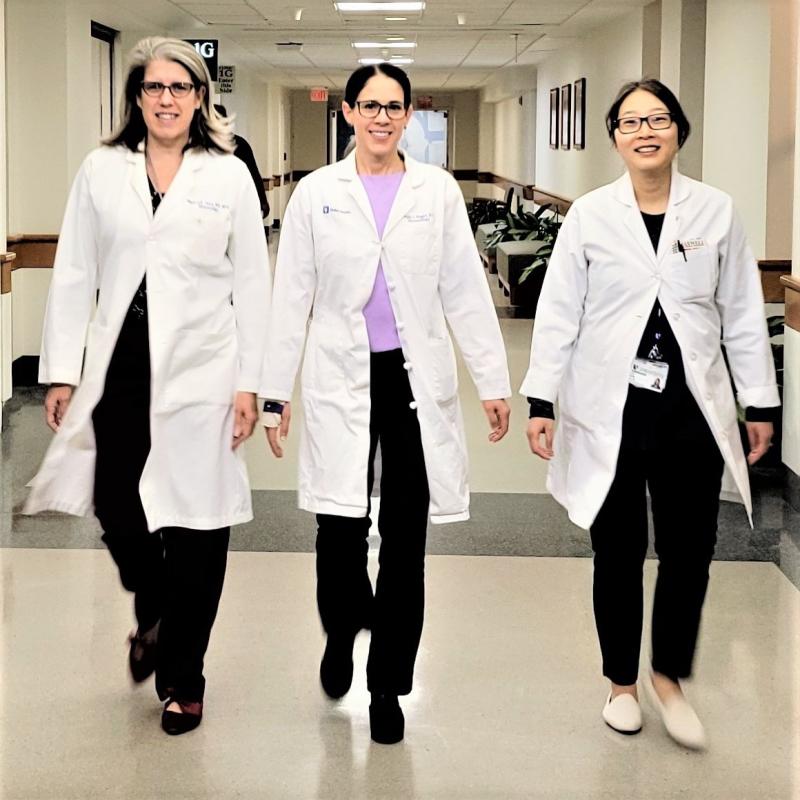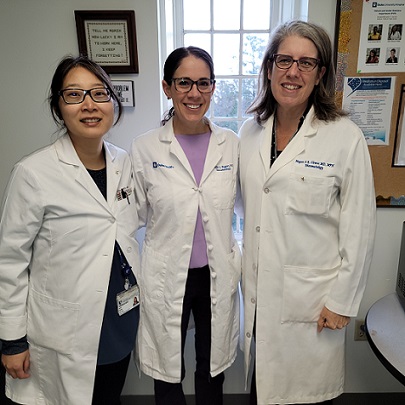
When new Rheumatology and Immunology Division Chief Dr. Megan Clowse asked faculty colleagues what they want the future of Duke Rheumatology to look like, many cited the Duke Lupus Clinic (DLC) as their ideal model of collaborative care and science.
Known for its clinical care, exceptional training, and innovative autoimmunity research, the DLC shines as a beacon for the practice of good medicine. DLC has consistently and uniquely modeled a highly collaborative, patient-centric approach to lupus care since its inception in 2007 by rheumatologists, Drs. Clowse and Vice Chair for Education Lisa Criscione-Schreiber. Dr. Jennifer Rogers is the current DLC director.
Systemic lupus erythematosus (SLE or lupus) is a complex, chronic, heterogeneous autoimmune disease where the body’s immune system attacks its own tissues causing inflammation which can lead to a variety of symptoms, diverse manifestations, poor health-related quality of life and organ damage. Given the challenging clinical presentation, the rheumatologists in the DLC have found that working together and sharing patients has improved the care they provide.
“This allows us to brainstorm improved approaches to their care, which we find very valuable,” Clowse said. “We have found that this decreases provider burnout and stress by increasing the mental and emotional support that we can provide to each other while managing this very challenging disease.”
The shared DLC practice is staffed by seven rheumatologists, a rotating advanced practice provider, and rotating fellows and residents, all of whom care for lupus patients in addition to a dedicated clinical pharmacist and a licensed clinical social worker who focuses on coping with chronic illness, pain and insomnia.
It is also one of the largest lupus clinics in the southeast serving over 500 patients annually, 90% of whom identify as female and over half as African American. About half of DLC patients come from medically underserved areas in North Carolina, on average traveling 70 miles to visit the clinic’s providers. An urgent lupus clinic has recently been added along with telehealth services, expanding the clinic’s reach.
“Everything we do in our lupus clinic is designed with our patients in mind,” Rogers said. “We are dedicated to providing outstanding state-of-the-art, patient-centered care and patient-centered research in order to improve the lives of those living with lupus. We have integrated our research program into routine clinic care and specifically design and implement research studies through that lens.”
Integrating Research Pathways
The integration is supported by the Duke Lupus Registry, a prospective clinical registry and biorepository of over 480 lupus patients. Established to improve patient care by following detailed clinical information, disease activity, and clinical outcomes, the registry has also served as the backbone of multiple research projects by DLC faculty members for grants both internal and external to Duke.

DLC provider Dr. Kai Sun is focused on medication adherence, a significant issue for lupus patients because of the complexity of the disease that often leads to many medications and a complex medication regimen. Dr. Rebecca Sadun is studying immune response to vaccination in people with SLE. Rheumatologist Dr. David Pisetsky’s research has revealed a potential biomarker for assessing and monitoring the disease.
Dr. Rogers and Amanda Eudy, PhD, are focused on a novel approach to categorizing lupus manifestations with the Type 1 and Type 2 SLE categorization model, developed in the Duke Lupus Clinic as a means of capturing the full spectrum of lupus symptomatology and bridging the gap between patient and provider perspective and communication. According to the model, signs of SLE are grouped into two categories: Type 1 SLE representing traditional SLE manifestations such as nephritis and arthritis. Type 2 SLE activity encompasses the often-intangible manifestations such as pain, fatigue, and brain fog. Type 2 SLE symptoms are often the most common and debilitating features of SLE.
“We have brought in the whole spectrum of lupus symptomatology, and importantly the patients’ lived experience under that SLE symptom umbrella and separated them to Type 1 and Type 2 symptoms,” Rogers said. “It has been very transformative in how we practice.” “This approach pushes our physicians out of their comfort zones towards the unmet needs of our patients,” Clowse said.
To standardize the approach to evaluation and assessment of Type 2 SLE, the Duke lupus research team developed the Type 2 Physician Global Assessment (PGA), a visual analogue score assessing Type 2 SLE activity. By implementing the Type 2 GPA into clinical practice, the documented management of Type 2 symptoms greatly improved from 53% to 89% for patients with high Type 2 SLE activity, Rogers added.
The team was recently awarded a $1.5 million Department of Defense Transformative Vision Award to develop and test a new Whole Health Empowerment for Endotypes of Lupus (WHEEL) program, which is group-based health-coach led program with curricula developed specifically for patients with different causes for Type 2 symptoms.
Lupus patients also face concerns over social drivers of health such as transportation and food insecurity. DLC was recently awarded the Aurinia Impact Award to address some of these needs with funding going toward a quality improvement project by rheumatology fellow Dr. Shannon Herndon to ensure that patients who screen positive for food or transportation insecurity are referred for assistance.
Transforming Pregnancies
Lupus disproportionately affects women, the majority of whom present during their peak reproductive years. Because some medicines used to treat lupus symptoms are teratogenic and can cause birth defects, DLC is deeply involved with ongoing research to help pregnant women and women planning to become pregnant with autoimmune diseases like lupus.
To help lupus patients have safer pregnancies, Clowse established the Duke Autoimmunity in Pregnancy Clinic and a prospective registry which contains clinical, lab, and medication data, and pregnancy outcomes from over 1000 pregnancies in women with rheumatic disease. From this data, Dr. Clowse has studied the association of disease activity, medications, and pregnancy timing on pregnancy outcomes. Clowse, an internationally recognized researcher on lupus, also developed HOP-STEP and the LupusPregnancy.org, both designed to improve pregnancy planning and management for women with lupus.
Learning Evidence-Based, Compassionate Care
Rheumatology fellow Dr. Dahima Cintron believes the DLC is not only a great place to learn about lupus in clinical practice but also in theory.
“It is a unique clinical space with multiple providers who implement evidence-based practice,” she said. “As a fellow that means that we get to interact with each of them and learn the different approaches to lupus management based on scientific literature. Up-to-date care on lupus nephritis, reproductive counseling, Type 1 and 2 lupus symptoms, and new medications are only a few of the main topics we get to be exposed to.”
Patients, she added, also value the time each physician takes with them and their holistic understanding of both the patient and the disease. “They feel comfortable talking about not only the skin rash or joint pain, but also the emotional struggles and quality of life burden. The DLC has been able to capture that environment and use it to completely address a patient's needs,” she said.